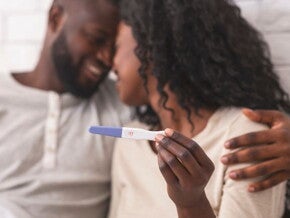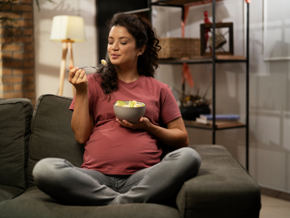
Pregnancy Symptoms: Early Signs, What to Expect, and Helpful Tips
Signs and symptoms of pregnancy may arise due to hormonal changes during pregnancy or pre-existing medical conditions that affect a pregnancy. Being open and honest with your healthcare professional, as well as going to all your health check-ups is the best way to stay on top of these symptoms and help minimise any complications as a result.
Below is a list of some common signs and symptoms of pregnancy plus some positive action steps you can take that might help make your pregnancy all it can be.
Earliest signs of pregnancy
Missing your period and feeling a little unwell are some of the earliest signs of pregnancy – but there are many other early pregnancy symptoms that may indicate you are pregnant. Some people say they feel certain they’re pregnant at the moment of conception, thinking they can already feel the very first pregnancy signs. While for others it may take a positive pregnancy test – or two – to convince them. If you notice any of the following early signs of pregnancy, it’s best to take a home pregnancy test:
- Breast changes
- Nausea and vomiting
- Fatigue
- Slight spotting or cramping
- Mood changes
- Food craving
What to do if you suspect a pregnancy?
If you are experiencing one or more of the above signs of pregnancy, it may be time to either take a home pregnancy test or see your doctor. A home pregnancy test offers a convenient and private way of testing whether you are pregnant. Remember early pregnancy symptoms can be misleading and even if you get a positive pregnancy test, get the results confirmed by your doctor.
While you wait for your pregnancy to be confirmed, it’s safest to act like you are pregnant. There are a number of lifestyle changes you need to make such as stopping alcohol and smoking, as well as getting your diet in order, which will include avoiding some high-risk foods during pregnancy.
If your pregnancy test is negative, and you are looking to fall pregnant, talk to your doctor about your lifestyle to see if you need any modifications to help assist you along the way. It’s not always easy to get pregnant, here are 5 tips that could help, as well as trying our Ovulation calculator to help you determine the best time to conceive.
Pregnancy symptom – Changes in your breast
Your breasts can start changing soon after conception, becoming fuller, heavier and more sensitive, thanks to changing hormones. You may also notice your nipples darkening.
- Tip: If your nipples are tender, try a breast pad to reduce friction. For tender or swollen breasts, it may be time to buy a maternity bra with no underwire, that gives you room to grow!
Pregnancy symptom – Nausea and vomiting
Morning sickness (and not just in the morning!) can kick in any time after conception. There can be varying degrees of morning sickness - some lucky women don’t experience any at all! If you have severe nausea and can’t keep anything down, contact your doctor.
- Tip: Eat small amounts regularly, try to keep your meals and snacks to healthy choices. Avoid greasy and spicy foods which may aggravate your stomach, and you may want to stay out of the kitchen if food smells set you off.
Pregnancy symptom – Tiredness and fatigue
Although fatigue is common in the first weeks as your progesterone levels rise, tiredness often continues into your first trimester and may last throughout your pregnancy. Fatigue which continues into late pregnancy may also be a result of low iron levels or anaemia. Your doctor will monitor your levels throughout pregnancy and may recommend tablets or an infusion if required.
- Tip: Take as much rest as possible. You may find that even sitting with your feet up gives you relief. Eat foods rich in iron throughout your pregnancy to help maintain adequate iron stores.
Pregnancy symptom – Mood swings
You may notice irritability caused by the drastic hormonal changes in your body. These fluctuations can lead to heightened emotions, making you feel more sensitive or reactive than usual. Mood swings can be a common pregnancy symptom and can affect your overall well-being.
- Tip: Try to avoid stress, communicate your needs and pamper yourself. Practicing self-care is essential; consider engaging in activities that bring you joy, such as reading, gentle exercise, or spending time in nature. Surrounding yourself with supportive friends and family can also help you navigate these emotional ups and downs.
Pregnancy symptom – Frequent urination
Early in your pregnancy, you may notice you’re using the bathroom more frequently. Your body starts producing more blood which means your kidneys process extra fluid. This extra water ends up in your bladder and needs to go somewhere! During the later stages of your pregnancy the increasing size of your baby pressing on your bladder will also mean more frequent toilet trips.
- Tip: Empty your bladder as frequently as required – it might help to always use the bathroom before you go to sleep at night!
Pregnancy symptom – Food cravings
Pregnant women often experience cravings or aversions for foods. Some women even develop strange cravings for non-food items like soil or paper. Speak to your healthcare professional if you have any ‘unusual’ food cravings, as it may indicate a nutrient deficiency.
- Tip: Try to opt for healthy snacks and nutrient packed meals to meet your additional nutritional needs and give you the energy you need.
Pregnancy symptom – Heightened sense of smell or taste
Pregnancy hormones can affect your taste buds and sense of smell. Many women report a more intense perception of scents, which can lead to aversions to certain foods or even everyday odours. This heightened sensitivity can make previously enjoyable meals seem unappetising, while other flavours may become particularly appealing. Listen to your body during this time and adjust your diet accordingly.
- Tip: Try to keep to healthy snacks and meals as you maintain a balanced and nutritious diet. Experimenting with different flavours and textures may help you discover what works best for you during this time.
Other signs and symptoms of pregnancy
There are a range of other pregnancy symptoms women experience, for example constipation, backache, itchy skin and leg cramps. However, these could all be indicative of other non-pregnancy conditions. See your doctor if in doubt about any pregnancy symptoms you’re experiencing.
The list above is by no means exhaustive, and for an unlucky few, you may experience those listed above, and more! This may include heartburn or indigestion, which are normally experienced later in pregnancy. Back pain, skin changes and itching, shortness of breath and even dizziness are some other symptoms you may experience. If you are faced with heartburn, you could consider over the counter antacids to help relieve your symptoms. Remember to always speak with your healthcare professional before starting any new treatments. For any unusual pregnancy symptoms that you are worried about, always chat to your doctor about it.
Frequently asked questions about pregnancy symptoms
When do pregnancy symptoms start?
Pregnancy symptoms can typically begin to appear after a missed period, which is usually about two weeks after conception. However, some women may notice symptoms even earlier.
What are the first signs of pregnancy?
The first signs of pregnancy can include a missed period, nausea, breast tenderness, fatigue, and frequent urination. Some women may also experience mood swings and food cravings. Some women may not experience any of these. Every woman’s pregnancy journey is different, speak to your doctor if you are concerned about any pregnancy symptom, or the lack of pregnancy symptoms.
Is diarrhoea a sign of early pregnancy?
Diarrhoea is not a common sign or symptom in early pregnancy. However, hormonal changes or dietary changes during pregnancy may lead to gastrointestinal disturbances, including diarrhoea.
Can you still have a period and be pregnant?
While it is possible to experience light bleeding or spotting during pregnancy, it is not the same as a regular menstrual period. A true period typically does not occur if a woman is pregnant. Speak to your doctor as soon as practical if you experience any bleeding or spotting during your pregnancy.
What are the symptoms of pregnancy?
Common pregnancy symptoms can include missed periods, nausea (morning sickness), breast tenderness, fatigue, frequent urination, mood swings, and food aversions or cravings.
How can I tell that I am pregnant?
The most common way to determine pregnancy is to take a home pregnancy test after a missed period. Blood tests conducted by a healthcare professional can also confirm a pregnancy.
How soon does morning sickness start after conception?
While every pregnancy is different, morning sickness can begin as early as two weeks after conception, often coinciding with the time of a missed period. It is commonly one of the first pregnancy signs women experience and usually peaks around the 6th to 8th week of pregnancy but can last much longer for some women. If you are concerned about your health or nutritional intake related to morning sickness, talk to your healthcare professional.
Is tiredness a sign of early pregnancy?
Yes, tiredness or fatigue is a common sign and symptom in early pregnancy. It is often caused by hormonal changes and the body's increased energy demands during early pregnancy.
Sources
- Pregnancy Birth and Baby Website. Accessed at https://www.pregnancybirthbaby.org.au/early-signs-of-pregnancy
- Health Direct website. Accessed at Early-signs-of-pregnancy_v24-04-25






